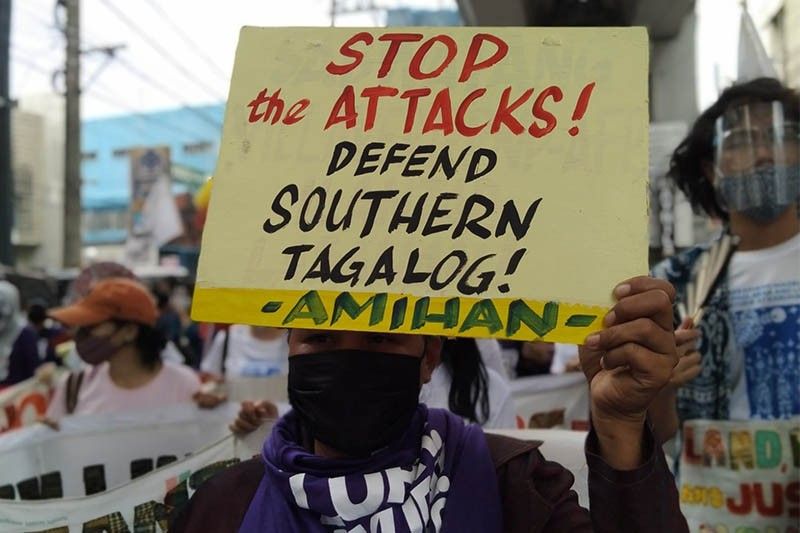Investigate PH: 'Tokhang' template seen in killings of Filipino activists

MANILA, Philippines — Oplan Tokhang, the national police's strategy of "knocking and pleading" with alleged drug personalities, is now being used in the "overt campaign of killing political dissenters," a global investigative panel said Tuesday.
In a second report that will be submitted to the United Nations Human Rights Council, Investigate PH said a "systematic killing machine" developed in the Duterte administration's "war on drugs" is being adapted and expanded in the government's anti-insurgency efforts.
Investigate PH is a coalition of lawyers and faith-based groups conducting an independent probe into human rights violations in the Philippines. The creation of the international investigation was prompted by what it said was a "weak" resolution of the United Nations Human Rights Council in its 45th session last year.
"Police and soldiers are now executing human rights defenders and political dissenters in a manner similar to extrajudicial killings in anti-drug operations," the report reads.
Commissioners of the international investigating panel pointed to Resolution No. 4 s. 2021 signed by members of the Cordillera Regional Law Enforcement Coordinating Committee, entitled: "A resolution enjoining the members of law enforcement agencies together with representatives of LGUs to conduct ‘tokhang’ to known left-leaning personalities in the government, media and other entities.”
The resolution reads:
"A strategy is needed in addressing the insurgency problem of the Cordillera Region. This could be by way of the ‘Oplan Tokhang’ strategy being used in the government’s war on drugs by visiting/knocking on their residences and plea for them to stop dealing and using drugs. The same concept is envisioned to known left-leaning personalities by visiting/knocking on their respective residences and plea or dissuade them from further supporting, or being active members of the CPP-NPA-NDF or any of its known Front Organizations."
'Bloody Sunday used war on drugs tactics'
Tokhang, a combination of Bisaya words “tuktok” (to knock) and “hangyo” (to plead), was the strategy employed by police and local government officials to confront suspected drug personalities in their homes.
The tactic is seen by many as the catalyst for the administration's controversial anti-narcotics campaign, which police data says has killed over 6,000 since it began in 2016. Rights groups both here and abroad say the actual death toll may be as high as 30,000.
"While the exposure of this plan in the Cordillera has delayed its implementation, this new version of 'tokhang' was used in raids in the Calabarzon provinces," Investigate PH said.
It was referring to the series of raids earlier in March, dubbed "Bloody Sunday", that resulted in the killings of progressive leaders and labor activists.
To recall, police conducted simultaneous raids to serve separate search warrants on activists in Batangas, Cavite, Rizal and Laguna. The police said teams killed activists who had fired on them first, a common narrative in police operations, including those in the "war on drugs."
The allegations of firearms and explosives that led to police serving search warrants are a common narrative that, rights lawyers noted, has led to the arrests of many activists in the past.
READ: 'Bloodbath Day': Deaths, arrests reported in police raids in Calabarzon
'War on dissent'
The global panel also pointed to Executive Order No. 70 that instituted a "whole of nation" approach against the communist insurgency and created the National Task Force to End Local Communist Armed Conflict.
According to Investigate PH, the order only "expanded the government departments required to cooperate with the military and the police way beyond the DILG, encompassing welfare, education and health departments," calling the ensuing effort "the broad-based counterinsurgency program which has heightened into a war on dissent."
National police leadership continues to deny that the law is being weaponized against critics of the government. Police Gen. Guillermo Eleazar has gone so far as implying that the targeting of activists and progressive groups in many police operations is a mere coincidence.
“Every time we have police operations, especially the service of search or arrest warrants, the defense of individuals who just happen to be members of progressive groups that we have come to expect is the allegation that our operation is illegal or that they were harassed or planted evidence on," Eleazar said earlier.
— with reports from Gaea Katreena Cabico and Christian Deiparine
- Latest
- Trending

































